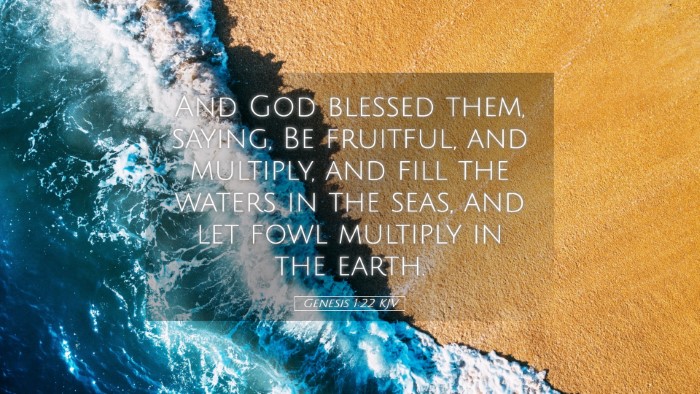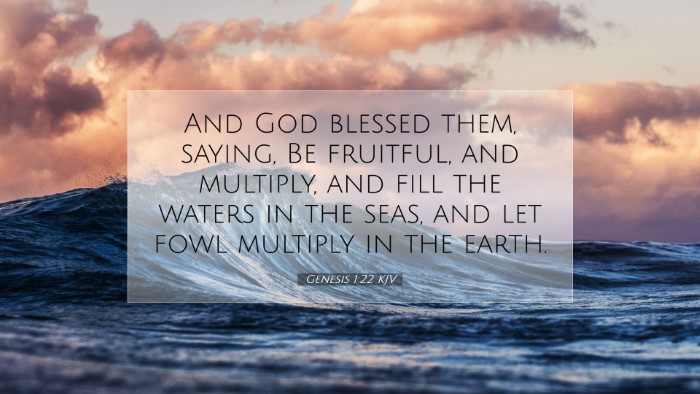Commentary on Genesis 1:22
Verse: "And God blessed them, saying, Be fruitful, and multiply, and fill the waters in the seas, and let fowl multiply in the earth." (Genesis 1:22)
Introduction
This verse, set within the majestic account of creation in Genesis, captures the divine command to the creatures of the sea and the birds of the air. It speaks to God's intention for abundance and vitality within His creation. This commentary seeks to explore the theological and practical implications of this verse, drawing on insights from esteemed public domain commentaries such as those by Matthew Henry, Albert Barnes, and Adam Clarke.
The Command to Multiply
In this verse, the directive issued by God to the creatures—"Be fruitful, and multiply"—underscores a few key themes:
- Divine Blessing: The act of blessing indicates not just permission but empowerment. As Matthew Henry highlights, this divine blessing is crucial; it infuses the creatures with the ability to reproduce and thrive.
- Cosmic Order: Albert Barnes notes the structured nature of creation, where each category of life has a role. God’s command reflects His sovereign plan for harmony and balance in the natural world.
The Sphere of Influence
The "waters in the seas" and "the earth" represent the domains that these creatures inhabit. Adam Clarke emphasizes that while the birds are instructed to multiply upon the earth, the creatures of the sea are equally integral to the ecosystem.
- Ecological Responsibility: The command to “fill” suggests a responsibility not just to exist but to thrive within their environment. The well-being of the ecosystem largely depends on the health and proliferation of its various inhabitants.
- Symbolism of Water and Air: Water often symbolizes life, while air represents freedom. The creatures of the sea and sky illustrate both the nurturing and the liberating aspects of God’s provision.
Theological Implications
The blessings given in this verse connect deeply to broader theological principles:
- God’s Creatorship: The act of creation itself is a foundational theme. God's power as Creator is emphasized, showcasing His authority over nature. As Henry notes, creation is not merely an event but an ongoing reality sustained by God.
- Interconnectedness of Creation: This command reflects the interdependent nature of God’s creation. The flourishing of one species links to the vitality of others, illustrating ecological relationships that are divinely ordained.
- Grace and Provision: The abundance suggested by “be fruitful” reveals God’s grace. He desires life to flourish, pointing towards His character as a benevolent Provider.
Pastoral and Practical Applications
For pastors and theologians, Genesis 1:22 invites reflection on how God’s purposes are mirrored in the lives of believers:
- Embracing Growth: Just as God commanded the creatures to multiply, believers are called to grow spiritually and share the faith, reflecting God’s intention for life to flourish.
- Caring for Creation: This verse serves as a reminder of the church’s role in environmental stewardship. Caring for the earth aligns with the command to fill the seas and earth responsibly.
- Community and Multiplication: The communal aspect—“let fowl multiply”—suggests the importance of community in the faith journey. The church thrives when believers come together, fostering growth and health within the spiritual family.
Conclusion
Genesis 1:22 encapsulates a divine directive that reverberates through time, calling creatures to fulfill their purpose through multiplication and abundance. For scholars, this verse not only serves as a testament to God’s sovereign oversight of creation but also challenges modern believers to reflect on their roles within God’s intricate design. Thus, echoing the sentiments of our esteemed commentators, we find that the complexities of creation are not just poetic expressions; they lay foundational truths about God’s nature and His ongoing relationship with the world.


